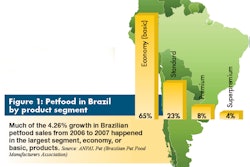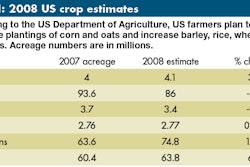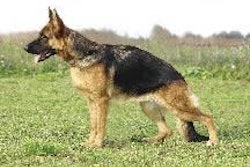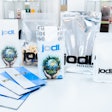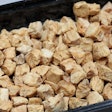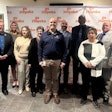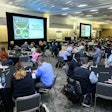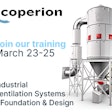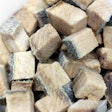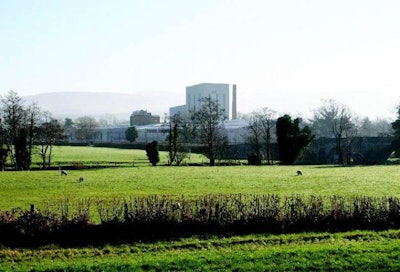
Business has come full circle in one way for David Davies, the managing director of Cambrian Pet Foods. It's been more than 25 years since he shut the doors of his butcher shop in a Carmarthenshire, United Kingdom, village and started to mix by hand his own brand of dried petfood within a small rented factory building.
Davies now heads one of the most progressive independent petfood companies in Britain, with his sons Jonathan and Richard as fellow directors, plus a staff of 76. And all are embarking on a canning venture.
The company has found its niche in an industry dominated in the UK by two large multinationals: Mars and Nestlé Purina. The move into wet food looks to further consolidate and strengthen Cambrian's independent position.
Grasping the opportunity
The company's new location, a former creamery on a 17-acre site at Llangadog in the picturesque Towy Valley of Davies' native Carmarthenshire, is just a short drive from the company headquarters in Pencader, UK. The headquarters includes a dry plant that underwent a major expansion in 2005. It produces premium petfoods under the brand name Gelert.
"With the wet products, my past experience within the meat trade is an advantage because I can help source and select the best raw materials from meat processors that we know," Davies says. "As with any product, it's is only as good as the raw materials; if you get them wrong, then the basis simply isn't there."
The closure of the Llangadog creamery - which had its own canning plant for custards and rice puddings and processed 210 million liters of milk per year, from the UK's largest milk field - was a major blow to the economy of an area once renowned for its dairy products.
But for Davies and his sons it was the opportunity they had been looking for. "It was always in our minds that if the opportunity became available we would grasp it," Davies says. "We are now one of only four petfood canneries in the mainland UK, the only one in Wales and the first to be set up in the UK since 1987."
On their own
Cambrian bought the site in January 2006. Besides the canning plant, the factory had a large cold storage facility, its own effluent treatment plant, water supply from five on-site boreholes, offices and a large warehouseall the facilities, utilities and infrastructure needed to run a wet petfood operation, with plenty of room for expansion.
"But we were on our own. No independent company had put a petfood cannery together in the UK for 20 years, so this project certainly took us all out of our comfort zone!" says Richard Davies, who along with David and a small team drove the project at Llangadog while also managing the growing dry food side of the business with Jonathan.
"We had bought some equipment as part of the creamery deal that we thought may have been suitable for our application, but there was no one to ask to obtain further clarification and confirmation," Richard continues. "We had to learn as we went along to put the plant together. For instance, the four rotary cookers that we had purchased with the site were not suitable for the manufacture of chunk in jelly products because they would degrade the product."
The site was a mix of buildings reflecting the expansion of the factory through the 1940s, 1950s and 1960s. "There were a lot of poor areas, including the canning hall, so we demolished it completely," says Richard. "We started from scratch. Money was an issue, and it would have been the cheaper option to use existing buildings and refurbish. But we knew that to achieve the standards that the industry and pet owners rightfully expect, we really had to build a canning hall designed to human food grade standards. All key equipment was also purchased brand new. And by applying previous lessons learned, we made sure we built the hall large enough to accommodate our next two phases of expansion."
With the assistance of a Welsh government grant, the company constructed a 60,000 square foot canning hall. It took most of two years to get the plant operational, but it was up and running by July 2007. By the start of this year production was settling in at around 300 cans a minute on a line with a capacity of 450 cans per minute.
Fit for humans
Cambrian's wet petfood is made with Category Three ingredients, meaning fit for human consumption, sourced from European Union-approved abattoirs in Wales and the rest of the UK. From these raw materials the company manufactures products in four wet formats: chunks in jelly, loaf in jelly, chunks in gravy and all meat.
After careful inspection and metal detection, mincing and emulsifying of the raw materials, jelly and minerals are added. The mixture is then pumped through a steam tunnel and cut into chunks. Gravy or jelly mix is added before the cans are sealed and then cooked for one and a half to two hours. The plant has three brand new PLC controlled retorts and space for four more. The can handling system is fully automated.
"Aside from building the new canning hall and investing in the best equipment, one of the best decisions we took was to employ two high caliber product development peopleformer Nestlé and Pedigree personnel," David says. "This decision was critical because it really shortened the learning curve, which reduced our R&D time by up to 12 months. That knowledge is now safely transferred onto our people, and the net result is that we have brought great quality products to the market far quicker than would otherwise have been possible." These include Gelert branded products as well as private label ones.
Pouches, holistic in the future
Future plans include increasing capacity at Llangadog threefold. "We have learned from experience to look ahead for the next five years," says Richard. "We are looking to go to 1,200 cans a minute initially on the cannery side and then look at the viability of investing in a soft can/pouch operation. One of the key benefits of this site was its scalability; all the utilities are here to run a far larger operation."
"A lot of people said the dry petfood market would just keep on increasing at the expense of cans," Jonathan Davies says. "We don't believe this to be the case anymore, and while we actively continue to profitably grow our dried food business at Pencader, there is definitely, in the UK at least, a trend back to wet foods in particular for health and holistic nutrition products.
"Our on-site laboratory at Llangadog is doing R&D work on an innovative health-type product," Jonathan adds. "People are looking for better, healthier products for their pets. Humanization has been the buzzword now for a few years, and we believe wet foods lend themselves better to innovative, humanized petfoods."
David Davies looks back with satisfaction on the company's progress and is proud of how his sons have acquired the expertise to help the company grow after starting out from very humble beginnings. "It was a stern apprenticeship but a very good one," he says. "We have re-invested all profits back into the business. We have grown within our capabilities and have received sound and prudent advice. We have excellent staff and the unstinting support of our loyal customers, local people, communities and the Welsh Assembly Government. We are very fortunate and grateful to all these people.
"We want to do the same in Llangadog as we have done at Pencaderfocus on quality and providing the best possible pet nutrition products."
.png?auto=format%2Ccompress&crop=faces&fit=crop&h=48&q=70&w=48)
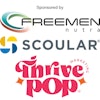
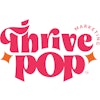
.png?auto=format%2Ccompress&fit=crop&h=167&q=70&w=250)
